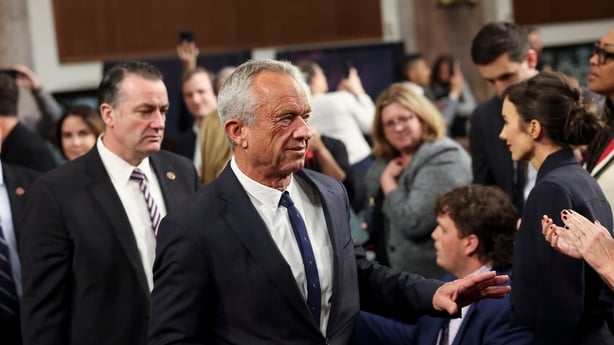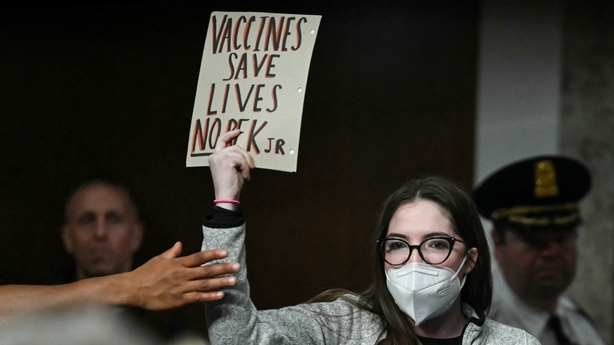US President Donald Trump's choice for health secretary, Robert F Kennedy Jr, has come under attack at a Senate confirmation hearing, with Democratic politicians accusing him of covering up his anti-vaccine views and embracing conspiracy theories to dissuade use of life-saving medicines.
Mr Kennedy sought to defend his record to the finance committee, promising that he was not against vaccines, and saying he would address rapidly increasing rates of chronic disease as well as follow Mr Trump's direction on abortion.
"I believe that vaccines play a critical role in healthcare. All of my kids are vaccinated," said Mr Kennedy, who attended the hearing with his wife Cheryl Hines and some of his children.
"We have the highest chronic disease burden of any country in the world ... This is an existential threat."
If confirmed, the 70-year-old would run the US Department of Health and Human Services, which oversees more than $3 trillion in healthcare spending, including the Food and Drug Administration and the agency in charge of Medicare and Medicaid health insurance programmes covering tens of millions of Americans.
The environmental lawyer is seen as a controversial pick among both Republicans and Democrats, mainly for having cast doubt on the safety and efficacy of vaccines.
During their questioning, Democratic senators brought up past statements from Mr Kennedy made over decades, including that no vaccine was safe and effective.
They quoted other remarks he made without evidence, including that Covid-19 was targeted to attack caucasians and black people, and that it was "highly likely" that Lyme disease was a military biological weapon.
"The receipts show that Mr Kennedy has embraced conspiracy theories, quacks (and) charlatans, especially when it comes to the safety and efficacy of vaccines," said Democratic Senator Ron Wyden in an opening statement.
"He has made it his life work to sow doubt and discourage parents from getting their kids life-saving vaccines."
We need your consent to load this rte-player contentWe use rte-player to manage extra content that can set cookies on your device and collect data about your activity. Please review their details and accept them to load the content.Manage Preferences
Democratic Senator Michael Bennet described Mr Kennedy as someone who speaks with conviction but has a record that includes half truths and false statements.
"It doesn't matter what you come here and say," Mr Bennet said. "It's not reflective of what you really believe."
Most of the nearly dozen Republican senators who questioned Mr Kennedy appeared to support the nominee, with some expressing appreciation for his goals of tackling illnesses including obesity and diabetes.
"Can't we come together as a nation and do this?" said Republican Senator Ron Johnson.
Finance committee members will vote on whether to send Mr Trump's pick to the full Senate for confirmation.
Mr Kennedy is also scheduled to appear in front of a Senate panel that oversees health tomorrow.
So far, the Republican-controlled Senate has not rejected any of the president's nominees.
Pete Hegseth, his controversial Secretary of Defense choice, was backed by 51 votes to 50 after Vice President JD Vance was needed to break a tie on Friday, despite concerns that the nominee was not qualified for the position, and allegations of sexual assault and alcohol abuse.

Speaking to reporters outside the Senate hearing, Republican Senator Thom Tillis said he thought Mr Kennedy was doing a "great job" and that he would likely clear the finance committee.
Mr Tillis was one of the politicians that opposition groups were targeting to vote against the candidate.
On two separate occasions, protesters disrupted the hearing. One shouted, "He lies," before being removed from the room.
Some supporters of Mr Kennedy wore "Make America Healthy Again" hats.
Mr Kennedy has decried the US food industry for adding ingredients he says make Americans less healthy.
During the hearing, he said fewer processed foods should be available in school lunches or for purchase with food stamps.
Both those programmes fall under the scope of the Department of Agriculture rather than the Department of Health and Human Services.
Some Republicans' questions were more pointed, including from Senator Chuck Grassley of Iowa, who told Mr Kennedy to leave agricultural practices to the agriculture department.
He seemed unsure about how to answer some questions on Medicare and Medicaid, which account for most of the US health budget.
In response to Republican Senator Bill Cassidy, Mr Kennedy said he did not have a proposal for reforming the Medicaid programme.

Senator Bernie Sanders questioned him over his involvement with the anti-vaccine group Children's Health Defense, which he founded.
Mr Sanders pointed to "onesie" clothes for babies sold by the group that tout phrases such as "No Vax, No Problem."
"I have no power over that organisation," Mr Kennedy said. He resigned as chairman in December, writing at the time that "it has been one of my greatest privileges and honors to lead this group over all these years."
Healthcare coverage advocacy group Protect Our Care organised a rally against Mr Kennedy ahead of the hearing, displaying mock headstones to represent deaths following a 2019 measles outbreak in Samoa.
The group said that he had visited the area at that time and spread misinformation about vaccines. Mr Kennedy denies any role in exacerbating the outbreak.
Caroline Kennedy, another member of the storied American political family, yesterday urged senators to vote against her cousin's nomination, calling him a "predator" with "dangerous" views on healthcare.
Some Republicans also object to Mr Kennedy's past comments in support of abortion rights, as well as his perceived stance against the pharmaceutical industry.
During the hearing, he said he agrees with President Trump that states should decide access to abortion.
